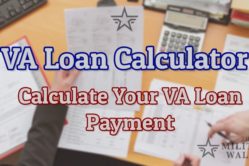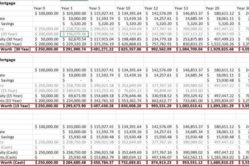VA Home Loans are amongst the best options for veterans looking to purchase or refinance a home. They offer several advantages over conventional mortgages, including lower interest rates and $0 down payments. The Department of Veterans Affairs (VA) provides the loan, which is self-sufficient and has its loans backed by the government. An essential aspect of the VA loan process is the VA funding fee.
My wife and I heard about the fee when we used a VA Loan to purchase our first home. We needed to know how to calculate the VA Funding Fee, how you pay it and who might be exempt. Here’s what we learned.
Table of Contents
What is the funding fee for a VA loan?
The VA funding fee is a one-time payment to the Department of Veterans Affairs (VA) that ensures the VA loan program can continue to operate and serve veterans.
Some veterans may be exempt and while most veterans pay a 2.15% funding fee, the actual price can range from 0.5% to 3.3% of your loan amount, depending on the following factors:
- Loan type
- Down payment
- First-time or subsequent user
- Loan amount
Calculating the VA Funding Fee
To calculate your VA loan funding fee, multiply the loan amount by the applicable funding fee percentage.
VA Funding Fee = Loan Amount x Funding Fee Percentage
For example, suppose you are a first-time homebuyer purchasing a home for $350,000 with no down payment. The 2023 VA funding fee percentage for first-time homebuyers with $0 down is 2.15%. The VA funding fee calculation would be $350,000 x 0.0215 (2.15 as a decimal), which equals $7,525. If the borrower chooses to roll the one-time fee into the loan amount, the total loan would equal $357,525.
$7,525 = $350,000 x 0.0215
The VA funding fee must be paid by the loan’s closing and is considered one of the closing costs a borrower is responsible for. You can finance the payment as part of the loan to avoid paying several thousand dollars upfront. Your lender will send the paid fee to the VA on your behalf.
VA Loan Funding Fee Charts 2023
As of April 2023, here are the funding fees for purchasing a property with a VA loan:
| Down Payment is | First-Time VA Loan use | Subsequent VA Loan use |
|---|---|---|
| Less than 5% | 2.15% | 3.3% |
| 5% or more | 1.5% | 1.5% |
| 10% or more | 1.25% | 1.25% |
In the 2023 VA Funding Fee chart above, the VA funding fee is greater for subsequent VA loan users than first-time users. First-time and subsequent burrowers can decrease the funding fee with a down payment of 5% or more.
VA Funding Fee for Refinance Loans
The VA provides two notable refinancing options: the Interest Rate Reduction Refinance Loan(IRRRL) and the VA Cash-Out refinance. The funding fee for each type of VA refinance varies, primarily due to the objectives of each one.
An IRRRL serves as a tool for current VA homeowners to obtain a lower mortgage rate or aim to transition from an adjustable rate to a fixed-rate VA loan. The VA IRRRL funding fee is 0.5% regardless of subsequent uses or service history.
A VA Cash-Out refinance offers qualified veterans the opportunity to refinance their homes while tapping into their equity and accessing additional funds. Eligibility for a VA Cash-Out refinance extends to eligible veterans with VA loans and those with non-VA loans.
The Cash-Out refinance loan VA funding fee is 2.15% for first-time users and 3.30% for subsequent users.
VA Loan Funding Fee Exemptions
Suppose you are hoping to waive the VA funding fee. In that case, you may be eligible for an exemption under the following circumstances:
- You have a service-connected disability rated at 10% or more
- You received a Purple Heart
- You are the surviving spouse of a veteran who died in service or from a service-connected disability
- You are a recipient of the Medal of Honor
These exemptions are specifically designed to cater to veterans who experienced significant service-related challenges, ensuring their financial burden is lessened when taking out a VA loan.
If you don’t know if you are exempt, you can check your Certificate of Eligibility (COE). It will say if you are exempt. If you don’t have a COE, check out our article on How to Get a VA Loan Certificate of Eligibility.
Can you get a refund on the VA funding fee?
Yes, you can get a refund on the VA funding fee if you are found eligible for an exemption after you have already paid the fee. For instance, if your disability claim is approved after closing on the loan, you will be entitled to a refund.
To be eligible for a refund of the VA funding fee, borrowers must have received VA disability compensation before the loan’s closing date, even if their VA Disability Claim is still pending.
To claim your refund, contact your VA lender or loan servicer or your VA Regional Loan Center. You will need to provide documentation proving your exemption status to the VA. Once the VA processes the information, they will distribute your refund. The refund process typically takes ten business days.

Equal Housing Opportunity. The Department of Veterans Affairs affirmatively administers the VA Home Loan Program by assuring that all Veterans are given an equal opportunity to buy homes with VA assistance. Federal law requires all VA Home Loan Program participants – builders, brokers, and lenders offering housing for sale with VA financing – must comply with Fair Housing Laws and may not discriminate based on the race, color, religion, sex, handicap, familial status, or national origin of the Veteran.




Comments:
About the comments on this site:
These responses are not provided or commissioned by the bank advertiser. Responses have not been reviewed, approved or otherwise endorsed by the bank advertiser. It is not the bank advertiser’s responsibility to ensure all posts and/or questions are answered.
Ronald W. Davis says
I will shortly be entering into my 3rd VA loan. This means that I have already paid two funding fees. As the purpose of the funding fee is stated to defray taxpayer costs in the event of non-payment of the loan, haven’t I already done that twice.
I have never never missed a payment–never do on anything. Hasn’t enough money been paid for the taxpayer guarantee?
Since the funding fee is a percentage of the loan amount, perhaps the only fee that should be considered is the difference between the refinance and the original loan amount.